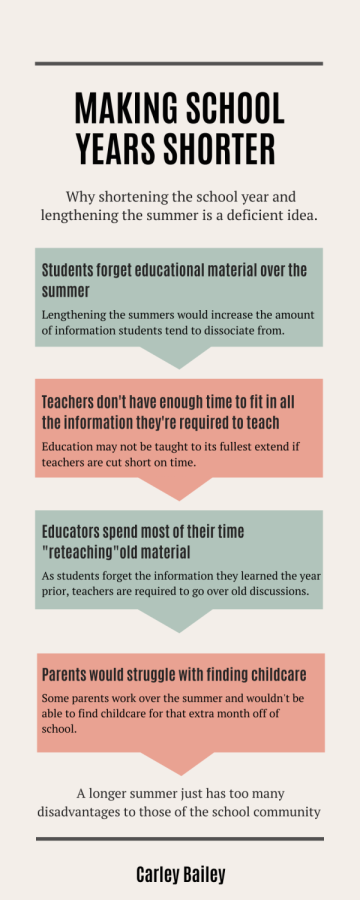Summing up the school year
Nebraska legislative bill establishes longer summer breaks
This legislative bill is an overall poor idea for Nebraska school districts and has many disadvantages that come along with it.
March 14, 2022
As the almost never-ending school year drags along through the bitterness of winter and chill of spring, the anticipation for summer to arrive quickly builds up. The warmth of the sun and humidity of the rain emits life back into the once shriveled world around us, uplifting moods and eliminating hardships. It seems as though summer just can’t come fast enough. Once the long awaited season of bliss finally arrives, those two months we’ve been dreaming of since the beginning of the year fly by in the blink of an eye.
Nebraska school districts differ in when they release staff and students into their summer breaks and when they reel them back in for the next dreaded school year. With some districts extending break longer than others, Nebraska state senators want to establish a bill to ensure that all schools start after Labor Day and end before Memorial Day, therefore shortening school years and extending summers quite drastically.
State Sen. Steve Erdman introduced this bill, Legislative Bill 1001, which would institute a state-wide academic school term for all Nebraska school districts to follow from the 2023-2024 school year and forward. Although this may only seem like a chance for students to get a longer break from school, shortening the school year would be detrimental to both students and teachers.
In multiple ways, this concept is a poor idea to the education system and school community today. There may be some benefits to instituting this bill to all Nebraska school districts, but numerous adverse effects come along with it.
If the school years happen to be shorter by even a month, teachers may not have enough time to fit in all the material that needs to be taught during the timespan of each school year. For that reason, the curriculum schools teach may be shortened and students won’t get all the information they need to intake. Summer, as it is, already increases the amount of time teachers have to spend “re-teaching” last year’s content, which may be very inconvenient toward teacher work ethic and the effort they put into educating.
Nonetheless, as teachers work long hours each week and take responsibility over hundreds of poorly behaved students, their breaks are well-deserved. With the help of Legislative Bill 1001, staff would be able to enjoy more vacation time off to rest and recuperate into the next school year. Many more open teaching positions would be filled if they know that they get a full summer off for vacation time or a second job. With this, a significant elimination of staff shortages would occur and schools would get additional helping hands.
As it shows, the bill doesn’t just help, but also harms. Students would get an obvious extensive amount of time off of school and extra days to take in the summer sun before returning to the prison of a place we call school. However, as much as I hate to say it, students forgetting what they learned over the summer has already become an issue. If the summers were to be extended longer, who knows how much it could affect students’ brains after returning to school. Summer vacation breaks the rhythm of instruction, leads to forgetting, and requires a significant amount of review once the school year rolls back around in the fall.
With both the advantages and disadvantages of this idea, it is clear that there just aren’t enough benefits for this bill to be profitable. Although it would be nice, the academic system is too greatly affected by this concept and would make a mess of the educational structure we’ve been using for years.







